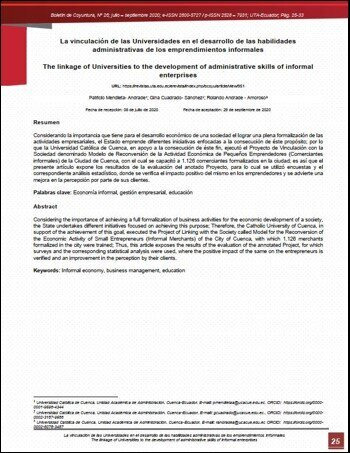The linkage of Universities to the development of administrative skills of informal enterprises
Main Article Content
Abstract
Considering the importance of achieving a full formalization of business activities for the economic development of a society, the State undertakes different initiatives focused on achieving this purpose; Therefore, the Catholic University of Cuenca, in support of the achievement of this goal, executed the Project of Linking with the Society called Model for the Reconversion of the Economic Activity of Small Entrepreneurs (Informal Merchants) of the City of Cuenca, with which 1.126 merchants formalized in the city were trained; Thus, this article exposes the results of the evaluation of the annotated Project, for which surveys and the corresponding statistical analysis were used, where the positive impact of the same on the entrepreneurs is verified and an improvement in the perception by the Your clients.
URL: https://revistas.uta.edu.ec/erevista/index.php/bcoyu/article/view/951
Downloads
Article Details

This work is licensed under a Creative Commons Attribution-NonCommercial 4.0 International License.
![]()
The publications of the Boletín de Coyuntura are licensed under a Creative Commons Attribution-NonCommercial 4.0 International License (CC BY-NC 4.0). The Universidad Técnica de Ambato retains the copyright of the published works, and favors and allows the reuse of these, as long as: the authorship and original source of publication is cited, and they are not used for commercial or onerous purposes. The intellectual property of the published articles belongs to the authors.
References
Bustamante, M., Díaz, R., & Villarreal, P. (2009). Economía informal: un análisis al comercio ambulante de la región del Maule, Chile. Forum Empresaria, 14(1), 35-57. Obtenido de http://www.redalyc.org/pdf/631/63111799002.pdf
Castiblanco, S. (2018). Castiblanco Moreno, S. E. (2018). Emprendimiento informal y género: una caracterización de los vendedores ambulantes en Bogotá. Sociedad y economía(34), 211-228. doi:DOI: 10.25100/sye.v0i34.6479
Cuadrado, G, Morocho, A, Calle, O, & Bonilla, V. (2017). La univesidad, los programas de capacitación y las asociaciones de comercio informa. RECIMUNDO, 1(5), 254-27. Obtenido de http://www.recimundo.com/index.php/es/article/view/73
Dután, J. (1991). Población del sector informal en la economía urbana de Cuenca: Formación y Funcionamiento. Quito, Ecuador: ILDIS. Obtenido de https://biblio.flacsoandes.edu.ec/libros/digital/56170.pdf
EDEC. (2017). Rendición de cuentas 2017. Obtenido de http://www.edec.gob.ec/sites/default/files/Rendicio%CC%81nDeCuentasEDEC.pdf
Gobierno Autónomo Descentralizado del Catón Cuenca. (2003). Ordenanza que regula las actividades del comercio ambulatorio y otras, en los espacios públicos del area urbana del cantón Cuenca. Obtenido de http://www.guardiaciudadanacuenca.gob.ec/sites/default/files/ordenanza182-comercio%20ambulatorio.pdf
INEC. (2017). Panorama laboral y empresarial del Ecuador 201. Obtenido de https://www.ecuadorencifras.gob.ec/documentos/web-inec/Bibliotecas/Libros/Panorama%20Laboral%202017.pdf
INEC. (2019). Boletín Técnico N° 03-2019-ENEMDU. Obtenido de https://www.ecuadorencifras.gob.ec/documentos/web-inec/EMPLEO/2019/Junio/Boletin_tecnico_de_empleo_jun19.pdf
Lafuente, C., & Marín, A. (2008). Metodologías de la investigación en las ciencias sociales: Fases, fuentes y selección de técnicas. Revista Escuela de Administración de Negocios, 64, 5-18.
Martínez, J. (2005). El sector informal en México. El Cotidiano(130). Obtenido de http://www.redalyc.org/articulo.oa?id=325/32513005
OIT. (2018). Mujeres y hombres en la economía informal: Un panorama estadísico. Obtenido de https://www.ilo.org/wcmsp5/groups/public/---dgreports/---dcomm/documents/publication/wcms_635149.pdf
OIT. (s/f). Empleo informal. Obtenido de http://www.oitcinterfor.org/taxonomy/term/3366
Pineda, J. (2014). Emprendimiento y género: el caso de la industria de la belleza en Bogotá. Sociedad y economía(26), 239-269.
Quezada, J. (2016). Análisis del sector de trabajo informal en el mercado El Arenal y propuesta para un mejor manejo y control; periodo 2014-2015. (Trabajo de grado). Universidad del Azuay. Obtenido de http://dspace.uazuay.edu.ec/handle/datos/6005
Rosado, L., & Castaño , G. (2015). Revisión del estado del arte de la Relación entre educación y desarrollo económico. Revista de Economía del Caribe, 5(16). doi:http://dx.doi.org/10.14482/ecoca.16.7693
Sepulveda, C., & Gutiérrez, W. (2016). Sostenibilidad de los emprendimientos: Un análisis de los factores determinantes. Revista Venezolana de Gerencia, 21(73). Obtenido de http://www.redalyc.org/articulo.oa?id=290/29045347003
UCACUE. (2016). FEM 001. Proyecto de Vinculación con la Comunidad - Modelo de Reconversión de la Actividad Económica de Pequeños Emprendedores (Comerciantes Informales) de la Ciudad de Cuenca. [Formato]. Archivo UCACUE.
Villalobos, G., & Pedroza, R. (2009). Perspectiva de la Teoría del Capital Humano aceca de la relación entre educación y desarrollo. Tiempo de Educar, 10(20). Obtenido de http://www.redalyc.org/articulo.oa?id=311/31112987002


